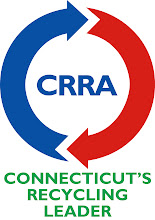Michele from Wilton, Conn., writes:
hello
I think your website is great - thanks for all of the information.
Why is it that only plastics #1 and #2 are accepted for recycling (So many food containers are #5 for example). Is there anywhere else to recycle the other numbered plastic items?
Also, if plastics with other numbers (like 5) are accidentally included in recycling are they seperated out somehow at your facility or at the town transfer station? If they are not seperated out do they contaminate the recycled matter?
This is a question CRRA hears frequently. The good news here is that people want to recycle more, but recycling is to a large extent driven by economics. We can take anything we want out of the waste stream, but unless someone wants it sooner or later it will wind up in the trash. At CRRA's recycling facilities in Hartford and Stratford, plastics #1 and #2 are sorted and baled for shipping to processors who turn them into new products -- #1 plastic is reformulated into fibers that are spun into fleece and carpeting, while #2 can be reformulated into a solid used in artificial lumber for playscapes and decks.
Processors pay for those plastics -- in many instances more than $300 a ton -- because they can be turned into new saleable materials. But the technology hasn't advanced to making recycling other types of plastics economically viable.
While we're on the subject of economics, CRRA has always provided its participating towns with free recycling (a substantial savings when compared to paying current fees of as much as $84 a ton for trash disposal) and now pays its Mid-Connecticut Project towns $10 a ton for all the recyclables they deliver to CRRA.
We can do this because of the revenue we receive from the sale of plastics and other materials such as paper, cardboard, steel and aluminum. There has been talk of expanding the bottle bill to include plastic water bottles, which are made of #1 plastic. Because the deposit system operates outside the established recycling program, CRRA would lose about $300,000 a year in plastic sales, hurting these important, convenient programs.
Subscribe to:
Post Comments (Atom)

No comments:
Post a Comment